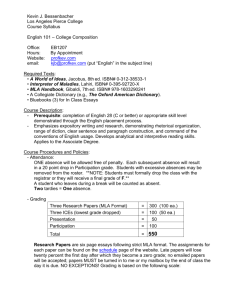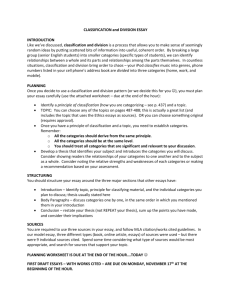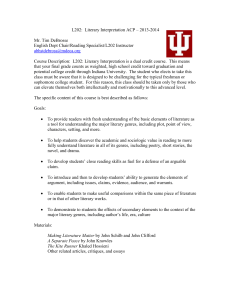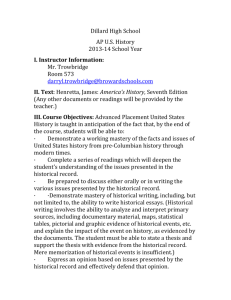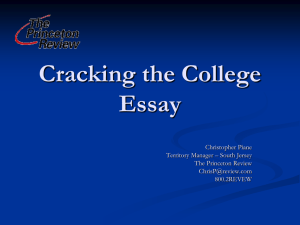Intermountain Center
advertisement
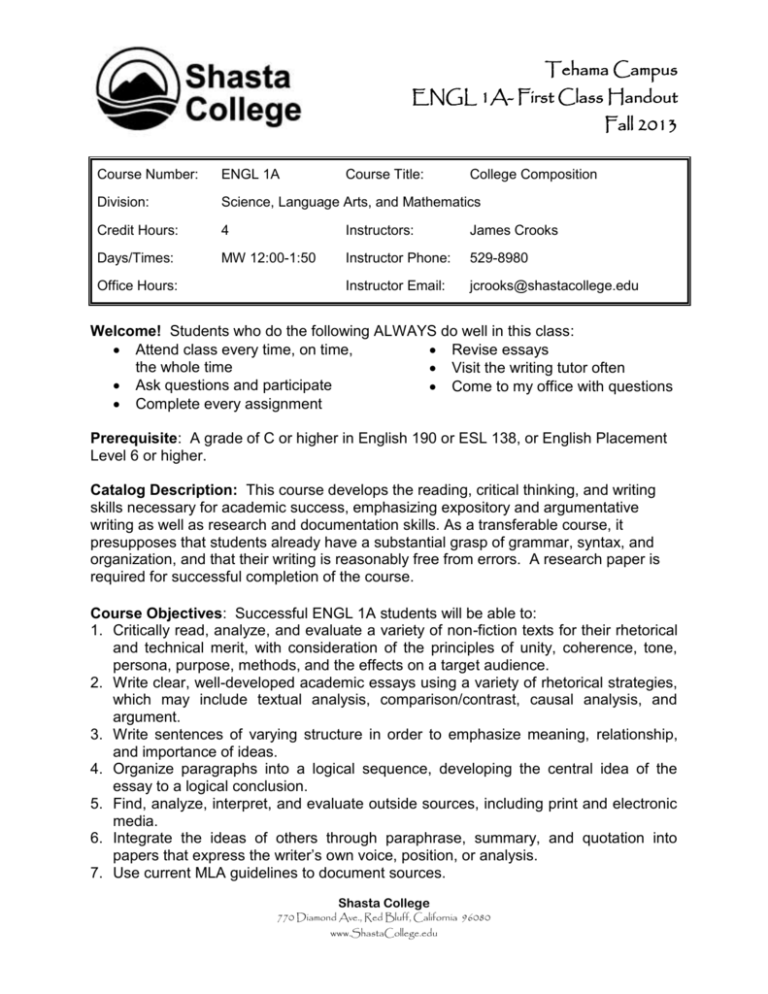
Tehama Campus ENGL 1A- First Class Handout Fall 2013 Course Number: ENGL 1A Division: Science, Language Arts, and Mathematics Credit Hours: 4 Instructors: James Crooks Days/Times: MW 12:00-1:50 Instructor Phone: 529-8980 Instructor Email: jcrooks@shastacollege.edu Office Hours: Course Title: College Composition Welcome! Students who do the following ALWAYS do well in this class: Attend class every time, on time, Revise essays the whole time Visit the writing tutor often Ask questions and participate Come to my office with questions Complete every assignment Prerequisite: A grade of C or higher in English 190 or ESL 138, or English Placement Level 6 or higher. Catalog Description: This course develops the reading, critical thinking, and writing skills necessary for academic success, emphasizing expository and argumentative writing as well as research and documentation skills. As a transferable course, it presupposes that students already have a substantial grasp of grammar, syntax, and organization, and that their writing is reasonably free from errors. A research paper is required for successful completion of the course. Course Objectives: Successful ENGL 1A students will be able to: 1. Critically read, analyze, and evaluate a variety of non-fiction texts for their rhetorical and technical merit, with consideration of the principles of unity, coherence, tone, persona, purpose, methods, and the effects on a target audience. 2. Write clear, well-developed academic essays using a variety of rhetorical strategies, which may include textual analysis, comparison/contrast, causal analysis, and argument. 3. Write sentences of varying structure in order to emphasize meaning, relationship, and importance of ideas. 4. Organize paragraphs into a logical sequence, developing the central idea of the essay to a logical conclusion. 5. Find, analyze, interpret, and evaluate outside sources, including print and electronic media. 6. Integrate the ideas of others through paraphrase, summary, and quotation into papers that express the writer’s own voice, position, or analysis. 7. Use current MLA guidelines to document sources. Shasta College 770 Diamond Ave., Red Bluff, California 96080 www.ShastaCollege.edu 8. Revise, proofread, and edit their essays for public presentation so they exhibit no gross errors in English grammar, usage, or punctuation. Student Learning Outcome: Students will write a college-level research paper that shows ability to use quotations correctly, follows the conventions of MLA format and of standard written English, and shows adequate topic development. Required Texts: Title: A Writer’s Reference Author: Diana Hacker and Nancy Sommers Edition: 7th ISBN: 9780312601430 Title: Writing from Sources Author: Brenda Spatt Edition: 8th ISBN: 9780312602901 Title: Unquenchable Author: Glennon ISBN: 9781597268165 Required Materials: You will need the capability to word-process, store, print, and upload documents. You will also need an email account, internet access, Shasta College Library card, binder, paper, pens, and dictionary. Statement of Instructional Methods: We will use lecture, discussion, visual aids, demonstrations, and group exercises to deliver the course content and help you achieve the course objectives. Turnitin.com and Moodle: You will submit some assignments to Turnitin.com and others to Moodle. Major Assignments Essays 800 pts Exercises 100 pts Writing Process 100 pts Grade Scale Points Earned Grade 1,000-900 A* 899-800 B* 799-700 C* 699-600 D 599-0 F Total 1,000 pts *Students must earn 70% or higher on the argument essay and the research essay AND earn 700 or more total points to earn a C or higher in the course. 2 Instructor Policies: Four Steps to Success. Step 1: Courtesy. Courtesy includes being polite and preventing disruptions. Common disruptions include arriving late, leaving early, having private conversations, using electronics, being rude, eating, and drinking. Disruptive students will be asked to leave. Step 2: Attendance. Attending class is important because it makes you available to learn. Missed class activities cannot be made up, but students may find out what they missed by attending office hours. Only registered students may attend classes. Step 3: Participation. Participation helps you learn. Participation includes active listening, note-taking, questioning, discussing, and completing in-class activities. Nonparticipation includes being absent, sleeping, texting, and avoiding activities. Step 4: Study. Consistent effort leads to mastery of course objectives. Devote eight hours per week to study for this class. “Studying” includes researching, reading, rereading, writing, revising, editing, attending tutor sessions, reviewing class notes, completing homework, and visiting office hours. Late Work. Late essays will be graded at my convenience, if accepted at all. No other late work is accepted. Extra Credit. There is no extra credit. College Policies: Drop/Withdrawal Policy: If you decide to stop attending, it is always your responsibility to officially drop or withdraw from the class. Special Accommodations: If you have a documented disability and wish to discuss academic accommodations, contact the Disability Resource Center in Room 2007 or call (530) 242-7794. Academic Honesty: You will produce original work written this term. This course follows the Student Standards of Conduct and the Student Discipline Sanctions in the Shasta College Catalog. Plagiarizing any work at all, in whole or in part, will result in a grade of F on the assignment. 3


